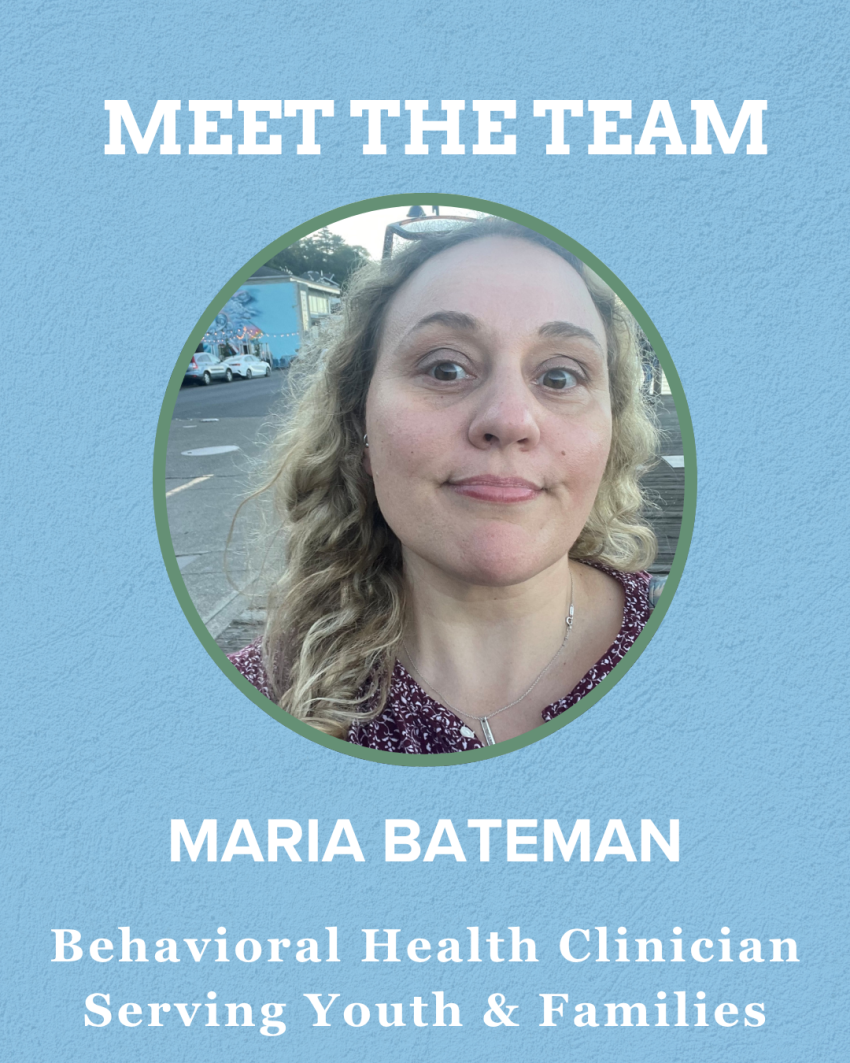At Tillamook Family Counseling Center, Maria Bateman brings a unique blend of education expertise, research experience, and clinical skills to her role as a Behavioral Health Clinician serving youth and families. With dual master’s degrees in public health and social work from Temple University, Maria’s journey to TFCC reflects her lifelong commitment to supporting vulnerable populations, particularly children.
From Education to Counseling: Maria’s Professional Path
Maria’s passion for working with children began in her teenage years. “I started working with children on the autism spectrum when I was 19 years old.” Initially pursuing special education and psychology at Chestnut Hill College in Philadelphia, Maria experienced various educational settings, from classroom teaching to online homeschool instruction.
What drove her was a concern for educational equity. She was particularly impacted by the experiences of her peers in special education classes who got bullied. “Growing up, I had an IEP being labeled as gifted. I saw the inequities of getting a great specialized education experience while other kids did not,” Maria shares.
After her teaching career was disrupted by school closures and layoffs during the 2008 recession, Maria pivoted to research, contributing to projects on housing discrimination and disability rights. “It was a cool opportunity,” she reflected. “I got interested in public systems like schools, housing markets, credit scores, and how these systems affect kids.” While the work was meaningful, Maria missed direct service.
She returned to school and pursued a dual Master’s program at Temple University, earning both a Master of Social Work (MSW) and a Master of Public Health (MPH) allowing her to blend her passion for one-on-one work with her interest in addressing systemic issues. Through this program, she deepened her understanding of how public systems impact children’s lives and developed the skills necessary for clinical practice.
Making the Move to Tillamook County
An AmeriCorps VISTA opportunity brought Maria to Tillamook County, where she initially worked with the public health department. Through community connections, she discovered TFCC and became the Child Advocacy Center coordinator. After completing her internship at TFCC under the supervision of Frank Hanna Williams and Michelle, she transitioned to her current clinical role working with children, teens, and young adults.
Community-Wide Mental Health Coordination & Therapeutic Approach
Maria’s schedule stays busy with a diverse caseload. While she primarily works with children and teenagers, her clients range from 8 to 43 years old. A major part of Maria’s work includes coordinating extensively with schools, special education teams, parents, caseworker and juvenile probation officers to ensure children receive the support they need across all areas of life. Maria also facilitates group therapy.
Maria employs several evidence-based approaches in her practice. Cognitive Behavioral Therapy (CBT) is an evidence-based approach to help her clients notice and change negative thought patterns and serves as Maria’s baseline. She also incorporates Dialectical Behavior Therapy (DBT), which teaches people skills like how to manage tough emotions, handle stress, and improve relationships, during sessions. For younger clients, she incorporates play therapy, art, and music therapy techniques. Currently, Maria is studying Internal Family Systems therapy to expand her therapeutic toolkit.
Challenges and Impact
Working in community mental health comes with distinct challenges. “We are in an FDA designated provider shortage area and we are doing the best we can with what we have,” Maria notes, highlighting the difficulty of keeping pace with growing mental health needs while managing administrative responsibilities.
Despite these challenges, she says, “The most rewarding part of my work is when I see a client come in and they are struggling and then two, three months later, we can see the change.
Through the multidisciplinary team model with positive communication across community partnerships, and the work the kids are putting into it, we see real change,” she shares.

Community Understanding & Kindness
When asked what she wishes more people understood about mental health, Maria emphasizes the importance of community response. “I wish our community knew that the way that we respond to each other impacts how successful our treatment plans are,” she explains. “As a community, if we can create more trauma-informed conversation with each other and communicate to understand that we are all impacted by trauma, we can be kinder to each other as a community, and that can have a momentous impact on our community members actively seeking help.”
Her message is simple yet powerful: “Kindness. We all deal with it.”
Finding Balance Outside Work
Outside of her professional life, Maria finds joy and recharges through meaningful connections. “My friends and family,” she answers without hesitation when asked what brings her joy. “I am very lucky to have friends and family who are amazing people, amazing human beings. I recharge with laughter!” Maria is also recently engaged to her best friend and couldn’t be happier.


